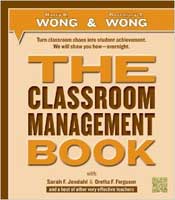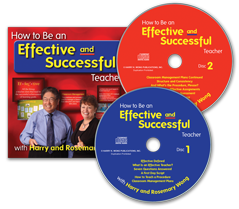|
 |

Special to the Gazette
October 2014
Sharing to Succeed
Sharing can take place in many ways, from formal professional learning communities to various websites on the Internet, from informal exchanges at school to educators sharing at conferences. Through the decades, we have been most fortunate to have people share with us. At the end of our presentations and at the end of our publications, we encourage people to send us their classroom strategies and anecdotes of their life. The multitude of contributions to these columns and our books started out as people who shared with us their stories. We are most grateful for those who have shared with us, such as the over 100 people who shared their ideas and are listed as contributors in the front of our new book, THE Classroom Management Book. This summer we spoke at over 20 teacher conferences, back-to-school meetings, and new teacher induction programs. These are some of the stories shared with us after those meetings. Each story is one of success. Read what they did, as what they did can be replicated for success in your classroom. Children Crave Consistency
There was no classroom management plan. Classroom order did not exist. The students were in control of the classroom. Not only was I chasing the students for the first many weeks I was there, I was on a runaway train! What I did was to start all over again on square one. I applied as many of the procedures taught in The First Days of School as I could. I cannot tell you how invaluable this was. The book was right on from the very first chapter. If the teacher does not spend the first days of school teaching procedures, he or she will be chasing the students for the rest of the school year. I’m not sure I got the train totally on the right track, but thanks to a little “First Days” of School remediation, I DID get it to slow down well enough to safely reach the final station. At the end of the year, my parents were falling over themselves to let me know how much they appreciated my stepping in and bringing some order to the classroom. Even more, many of my students came to me and said how much they appreciated me putting in a plan that they could count on every day. You are right; children crave consistency! The process works! No successful teacher can work without a classroom management plan. Only One Solitary Dollar in the Jar
This gave rise to my raising my voice to my charges. I realized after listening to you that there were MANY things I needed to change about my classroom management. Although my students liked me and the parents liked me, I knew there was something wrong. The military "Training Instructor" route was not all it was cracked up to be. I now meet the kids at the door, use music for the change of subjects, have brain breaks, and implemented procedures such as transition from place to place. But I had to do something about raising my voice when I wanted the attention of my class. I had to come up with something that would cost me. So I cleaned out a mayo jar, set it on my desk where everyone in my class could see, and made my announcement. If at any time I should raise my voice, the entire class was to simply point at the jar. If we were outside the classroom, they were to point to the sky. If I raised my voice, I would have to put a dollar from my pocket into the jar. I started carrying a lot of one dollar bills in my wallet. I told my class that we would have a party with the money in the jar. By the end of the year, I had put one solitary dollar in the jar! But putting the dollar in the jar was worth watching my class act as one pointing to the sky. We still had a party just to celebrate Mr. Weed not raising his voice but the one time. Life in my classroom will never go back to what it was before procedures and a mayo jar. It’s Not About Managing Behavior
After about two weeks, chaos had erupted in her classroom. The last straw for my principal was when she walked into the room and saw two boys wrestling on the floor and the sub I was asked to go into the classroom for two mornings and model classroom management while another sub covered my class. On the first morning, I opened the door, greeted the students, and gave specific instructions on what procedure I expected them to do. The sub was surprised that everyone complied! I continued the morning, giving specific instruction on other procedures following the principles in The First Days of School. At recess the sub asked, “How do you do it?” At the end of the two mornings, the class was back under control. The sub’s comment then was, “I’ve learned more about classroom management watching you than I did in all my university classes.” She was happy at what she had learned, and I was happy to share the process with her as a colleague. I gave her the copy of The First Days of School from the teachers’ section in our school library and told her all the secrets were in this book. I hope she will read it and realize that it is not about managing behavior. It is about managing a classroom. Teacher-of-the-Year in One Year
I researched and realized I could get my license through non-traditional licensure. My brother-in-law teacher gave me a copy of The First Days of School. I devoured the book cover to cover. The next year, I was hired as the new fourth-grade teacher. I was baptized in fire by “The Class.” Our school only has one class of each grade, and this bunch was feared and labeled by all the teachers. I was young and dumb, so I just loved and respected each child with all my heart. The respect was mutual and my students entered me into the Walmart Teacher-of-the-Year competition. I learned so much from your book, that in my first year as a classroom teacher, I became the Walmart Teacher-of-the-Year. With the help of The First Days of School, I made a procedures document for every conceivable instance. My classroom management worked thanks to these procedures. With high expectations in place for every student and a mutual, loving respect, my class has always had the highest test scores in the school. I spend the first days of school getting to know all I can about my students. I also let my students get to know me. I attend ballgames and dance recitals. In the midst of all this, we practice and rehearse procedures. Every day I greet my students at the door as recommended. I tell them this is a social skill and a procedure because I want to know if something is wrong first thing in the morning. I also want to know if they are excited about something they achieved the night before. Throughout the year we constantly practice life skills, life lessons, smiles, and manners. We create a social skills notebook together. I’m pretty decent at teaching study skills and test-taking skills. I would have to say that my greatest strength is building rapport with my students. They know that I have an open heart and open ears. If I tell them once, I tell them a hundred times—listening is and will always be their most important skill. I Now Live a Purpose-Driven Life
I turned to the assistant principal (the disciplinarian) for help and he basically told me to figure it out. He was so cold and bitter, and this made me feel even worse. After my first year, I felt like a failure, but I didn’t give up. I started to look for resources on effective teaching and classroom management and ended up reading the reviews for your iconic book, The First Days of School. I eventually ordered it and was so excited when it arrived in the mail. I quickly devoured the material and spent most of the summer creating innovative activities that were either directly from or inspired by your book. When I arrived back to school in early August 2002, I was a changed man. By the middle of the year, my principal (not the assistant) was singing my praises and bragging on my teaching and classroom management skills. By my third year, I was one of the best teachers in the building, and I went on to pursue my Masters and Doctorate in education. After my third year, I spent four more years in the classroom, and for the last five years, I have been working in higher education. I just accepted the position (September 2014) as Dean of the School of Education, Psychology, and Interdisciplinary Studies at Virginia Union University. Pretty good for a 35-year-old! As Dean, I am responsible for overseeing the training of teachers, administrators, counselors, psychologists, and others. If it wasn’t for your book, I would have left the field and ended up living a life that was contrary to my calling. I now live a purpose-driven life, and since I do what I love, I have never worked a day in my life since August 2002. That’s how you saved my life. After all, the unexamined life is not worth living and my career as a professor affords me this luxury. Your Story to Share
Your success may not be immediately evident. You may never witness the impact of your dedication and determination. With luck, you may experience the “light bulb” moment in a child, the warmth of a previously reluctant, “Good morning,” or the relief of a college acceptance letter. In all of these experiences, you were an integral part of the fabric that wove that child’s success. People who succeed have a story to tell. Please share it with us at RWong@HarryWong.com so we can use it to inspire and encourage other educators. What is your story of success?
|
|||||||||||||||
|


 Last year, I taught fifth grade. My background includes working with kids and families in different areas for numerous years: Juvenile Corrections for five years, youth ministry for ten, and working with military children in Turkey.
Last year, I taught fifth grade. My background includes working with kids and families in different areas for numerous years: Juvenile Corrections for five years, youth ministry for ten, and working with military children in Turkey.  I am a long-time teacher, and this past year I was team leader. One of our kindergarten teachers had a premature baby and a long-term sub was called in to take care of the class.
I am a long-time teacher, and this past year I was team leader. One of our kindergarten teachers had a premature baby and a long-term sub was called in to take care of the class. At the age of thirty-seven, I found myself soul searching, asking what was in store for my life. My teacher wife, a veteran teacher already, suggested I become a teacher. I started substitute teaching elementary students. I found my calling!
At the age of thirty-seven, I found myself soul searching, asking what was in store for my life. My teacher wife, a veteran teacher already, suggested I become a teacher. I started substitute teaching elementary students. I found my calling!  In the fall of 2001, I started my teaching career as a fifth-grade social studies teacher in my hometown of Hazlehurst, Mississippi. To be honest, my first year wasn’t necessarily a stellar one. In some ways, I felt inadequate and overwhelmed in the classroom. I would go home completely drained and frustrated. I was teaching students that were totally different from the students I interacted with during college field experiences and student teaching.
In the fall of 2001, I started my teaching career as a fifth-grade social studies teacher in my hometown of Hazlehurst, Mississippi. To be honest, my first year wasn’t necessarily a stellar one. In some ways, I felt inadequate and overwhelmed in the classroom. I would go home completely drained and frustrated. I was teaching students that were totally different from the students I interacted with during college field experiences and student teaching.  As the school year unfolds, you will be standing in front of the most important people on earth—your students—the future of this planet. Believe in yourself, in your strengths, and in the profession.
As the school year unfolds, you will be standing in front of the most important people on earth—your students—the future of this planet. Believe in yourself, in your strengths, and in the profession.






